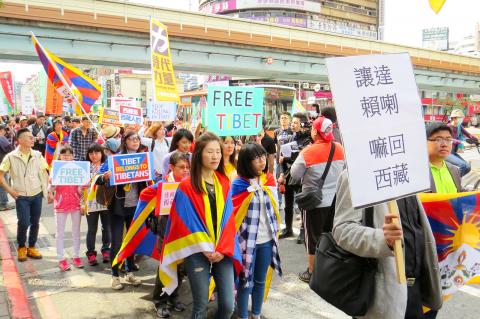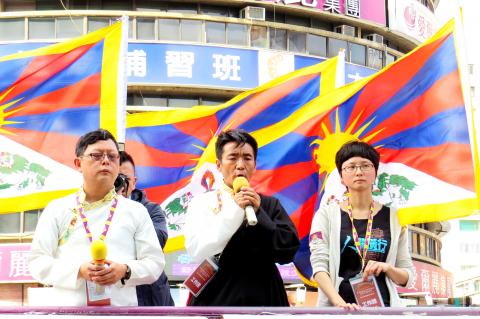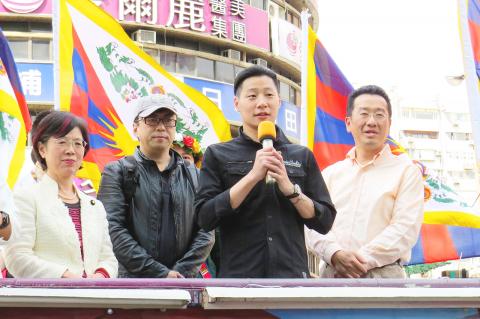More than 200 people from more 20 civic groups and lawmakers marched through downtown Taipei yesterday in a call to free Tibet and uphold human rights.
The march was to commemorate Tibetan Uprising Day — the March 10 anniversary of a failed 1959 uprising against Chinese rule — which sparked a sharp crackdown and led to the Dalai Lama’s exile.
Members of the Welfare Society for Tibetans in Taiwan (在台藏人福利協會), Human Rights Network for Tibet and Taiwan, Taiwan Association for Human Rights and other groups gathered in front of Pacific Sogo’s Zhongxiao E Road department store for a rally before setting off on the march, with numerous speeches by legislators expressing solidarity with the Tibetan cause.

Photo: Chen Yu-fu, Taipei Times
New Power Party (NPP) Legislator Freddy Lim (林昶佐) called for President Ma Ying-jeou (馬英九) and president-elect Tsai Ing-wen (蔡英文) to allow the Dalai Lama to visit Taiwan.
“President Ma has said many times that cross-strait relations have never been better, so I cannot think of a better time,” Lim said, adding that the president has cited a need to repair cross-strait ties in denying previous visits.
Ma’s government has refused to grant a visa to the Dalai Lama since his previous visit in 2009.

Photo: Chen Yu-fu, Taipei Times
Democratic Progressive Party (DPP) Legislator Tsai Yi-yu (蔡易餘) said that Tibet should serve as a “warning” of what might happen to Taiwan, calling for the Executive Yuan’s Mongolian and Tibetan Affairs Commission to be frozen to express solidarity with the Tibetan cause.
“The function of the commission is not clear and it looks like a deformity even when run by the Republic of China, because Mongolia does not belong to China anymore. That we still use the ‘Republic of China’ framework to lay claim to Tibet is at odds with their struggle for human rights and freedom,” Tsai Yi-yu said, adding that he would propose a refugee act to allow Tibetan exiles to be granted asylum.
DPP Legislator Kolas Yotaka — a Amis Aborigine elected on the party’s at-large legislative slate — said that Aborigines and Tibetans face similar challenges.

Photo: Chen Yu-fu, Taipei Times
Tibetans “are like China’s indigenous people, so we feel for them and should support them both in spirit and politically,” Kolas said, adding that Aborigines and Tibetans desire true autonomy to protect their cultures.
“We were both originally independent nations, but have been losing our political systems, social structures, religious beliefs and languages ever since colonizing powers came,” she said.
The group sang the Tibetan national anthem, while Tibetan monks prayed for a long life for the Dalai Lama before they marched away to chants of “Free Tibet” and “Long Live the Dalai Lama.”
A large portrait of the Dalai Lama led the procession, followed by more than a dozen Tibetans waving large Tibetan flags.
The group marched to the Kelti Building, which is often used to symbolize the Chinese government in the absence of a formal representative office, as it houses the offices of the Cross-Strait Economic and Cultural Interchange Association, the Bank of China and other Chinese associations and firms.
The group held a “die-in,” sprawling on the road in front of the Kelti Building in solidarity with Tibetan monks who have self-immolated to protest Chinese rule of Tibet.
The group marched to Taipei 101, saying they wanted to share their message with Chinese tourists.
Further events to mark Tibetan Uprising Day are scheduled for Thursday night at the National Chiang Kai-shek Memorial Hall’s Freedom Square and Kaohsiung’s Human Rights Learning Study.

The CIA has a message for Chinese government officials worried about their place in Chinese President Xi Jinping’s (習近平) government: Come work with us. The agency released two Mandarin-language videos on social media on Thursday inviting disgruntled officials to contact the CIA. The recruitment videos posted on YouTube and X racked up more than 5 million views combined in their first day. The outreach comes as CIA Director John Ratcliffe has vowed to boost the agency’s use of intelligence from human sources and its focus on China, which has recently targeted US officials with its own espionage operations. The videos are “aimed at

STEADFAST FRIEND: The bills encourage increased Taiwan-US engagement and address China’s distortion of UN Resolution 2758 to isolate Taiwan internationally The Presidential Office yesterday thanked the US House of Representatives for unanimously passing two Taiwan-related bills highlighting its solid support for Taiwan’s democracy and global participation, and for deepening bilateral relations. One of the bills, the Taiwan Assurance Implementation Act, requires the US Department of State to periodically review its guidelines for engagement with Taiwan, and report to the US Congress on the guidelines and plans to lift self-imposed limitations on US-Taiwan engagement. The other bill is the Taiwan International Solidarity Act, which clarifies that UN Resolution 2758 does not address the issue of the representation of Taiwan or its people in

US Indo-Pacific Commander Admiral Samuel Paparo on Friday expressed concern over the rate at which China is diversifying its military exercises, the Financial Times (FT) reported on Saturday. “The rates of change on the depth and breadth of their exercises is the one non-linear effect that I’ve seen in the last year that wakes me up at night or keeps me up at night,” Paparo was quoted by FT as saying while attending the annual Sedona Forum at the McCain Institute in Arizona. Paparo also expressed concern over the speed with which China was expanding its military. While the US

SHIFT: Taiwan’s better-than-expected first-quarter GDP and signs of weakness in the US have driven global capital back to emerging markets, the central bank head said The central bank yesterday blamed market speculation for the steep rise in the local currency, and urged exporters and financial institutions to stay calm and stop panic sell-offs to avoid hurting their own profitability. The nation’s top monetary policymaker said that it would step in, if necessary, to maintain order and stability in the foreign exchange market. The remarks came as the NT dollar yesterday closed up NT$0.919 to NT$30.145 against the US dollar in Taipei trading, after rising as high as NT$29.59 in intraday trading. The local currency has surged 5.85 percent against the greenback over the past two sessions, central